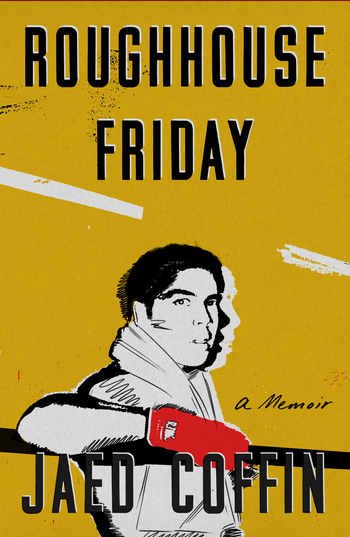A Review of Jaed Coffin’s Roughhouse Friday (FSG, 2019).
![[personal profile]](https://i.gr-assets.com/images/S/compressed.photo.goodreads.com/hostedimages/1491408111i/22407843.png) xiomara
xiomara
A Review of Jaed Coffin’s Roughhouse Friday (FSG, 2019).
By Stephen Hong Sohn
Jaed Coffin is the author of a previous memoir (A Chant to Soothe Wild Elephants), which I unfortunately still haven’t read. Sometimes I go backward, and I certainly will after reading Coffin’s Roughhouse Friday (FSG, 2019), a stunning work that concerns masculinity and coming-of-age involving a mixed-race Thai-American. Let’s let the official description over at the MacMillan site give us some context:
“While lifting weights in the Seldon Jackson College gymnasium on a rainy autumn night, Jaed Coffin heard the distinctive whacking sound of sparring boxers down the hall. A year out of college, he had been biding his time as a tutor at a local high school in Sitka, Alaska, without any particular life plan. That evening, Coffin joined a ragtag boxing club. For the first time, he felt like he fit in. Coffin washed up in Alaska after a forty-day solo kayaking journey. Born to an American father and a Thai mother who had met during the Vietnam War, Coffin never felt particularly comfortable growing up in his rural Vermont town. Following his parents’ prickly divorce and a childhood spent drifting between his father’s new white family and his mother’s Thai roots, Coffin didn’t know who he was, much less what path his life should follow. His father’s notions about what it meant to be a man—formed by King Arthur legends and calcified in the military—did nothing to help. After college, he took to the road, working odd jobs and sleeping in his car before heading north. Despite feeling initially terrified, Coffin learns to fight. His coach, Victor ‘the Savage,’ invites him to participate in the monthly Roughhouse Friday competition, where men contend for the title of best boxer in southeast Alaska. With every successive match, Coffin realizes that he isn’t just fighting for the championship belt; he is also learning to confront the anger he feels about a past he never knew how to make sense of. Deeply honest and vulnerable, Roughhouse Friday is a meditation on violence and abandonment, masculinity, and our inescapable longing for love. It suggests that sometimes the truth of what’s inside you comes only if you push yourself to the extreme.”
The description does an admirable job of giving us a sense of the stakes of this memoir, although that last line is far too sentimental, one that doesn’t ring true given the self-reflexivity and rawness of Coffin’s work. Coffin basically grows up in the shadow of his father’s abandonment. The contours of this abandonment are complicated by Coffin’s devout love of him and understanding that there’s something not quite right about the way Coffin and his mother are left behind. Coffin’s ambivalent disposition is what propels this memoir, especially as Coffin tries to carve out a path to become a man beyond the example given to him by his father. The problem is, of course, that Coffin’s father constructs an image of masculinity that is ultimately seductive, one borne out of the pages of Hemingway novels and frontier mythos. To rise up to this kind of man, we are not surprised to see Coffin then set out on a journey that tests his survival skills and his ability to fight in the ring. For all of Coffin’s navel-gazing, the concluding arc left me torn, but I will not provide any spoilers here. Suffice it to say that Coffin does set up a possible next sequence of memoirs, one that will move to yet another continent and place (I don’t know what the author has planned, but it would be a smart bet). Otherwise, this book would pair quite well with a memoir/autobiographical novel like Carlos Bulosan’s America is in the Heart, which traverses some similar terrain, yet penned in distinctly different centuries (as well as other Asian American novels set in Maine such as Mei Mei Evans’s Oil and Water and the recently published Unpassing by Chia-Chia Lin). There is a sobering side plot about indigenous education that reveals the problems of contingent labor and “stopgap” tutoring. You can’t help but wonder what happens to so many of the students that go Coffin’s way. And just a note: Coffin’s prose is particularly beautiful. There are moments where Coffin captures the rugged and austere landscape of the Alaskan wilderness. These times are certain to take your breath away. This year has been an incredible year for the memoir/creative nonfictional works. Roughhouse Friday certainly rises to the very top, alongside the recent publications of T. Kira Madden, Alexander Che, Esme Weijun Wang, and Julie Yip-Williams.
Buy the Book Here:
https://us.macmillan.com/books/9780374251956
Review Author: Stephen Hong Sohn
Review Editor: Nicholas Clark
If you have any questions or want us to consider your book for review, please don't hesitate to contact us via email!
Prof. Stephen Hong Sohn at sohnucr@gmail.com
Nicholas Clark, PhD Student in English, at nclar004@ucr.edu
 comments
comments



